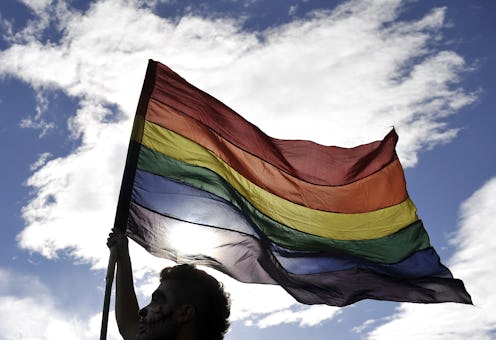In light of the recent horrific violence against LGBTQ people at Pulse nightclub in Orlando, it's more important than ever to step back and remember to take care of ourselves. One of the many challenges frequently faced by the LGBTQ community is finding LGBTQ-friendly mental health resources — but the good news is that they're not impossible to find. The five resouorces seen here are accessible in a variety of different ways and applicable in a variety of different circumstances, so no matter what your needs are, they're here for you. They've got your back.
Many remain shaken to their core after the attacks on LGBTQ people at Pulse, where the deadliest mass shooting in U.S. history occurred on June 12. In a press conference on Monday morning, officials confirmed that the attack left 49 dead and 53 wounded, and the queer community across the globe is mourning. For an attack like this to happen at all feels inconceivable, but during Pride Month, when LGBTQ people are typically able to celebrate our love and identities, this attack feels particularly targeted and terrifying.
In the day to day life, LGBTQ people are often victims of horrific acts of violence, even when they don't get media attention or response from law enforcement. This is why it's so important for the LGBTQ community to know where we have resources for support and guidance, from our friends, family, and loved ones, but also from licensed and trained mental health professionals.
Seeking out mental health help can always be frightening, but especially so if you're LGBTQ-identified and are fearful of experience bias or prejudice. But everyone deserves access to these services, no matter who you are, and no matter what you might need it for. Here are some specific outlets for LGBTQ-friendly mental health help:
1. Talkspace App
One excellent mental health resource that is proudly LGBTQ friendly is the app Talkspace. Talkspace is therapy available on the go, via text message, with 24/7 access and care. Talkspace hosts over 500 licensed mental health professionals, many of whom are LGBTQ identified themselves, who are open to and trained for LGBTQ specific needs and patients.
2. GLMA Mental Health Care Providers
If you or your loved one is interested in finding an LGBTQ-friendly mental health care provider you can chat with in person, it's always a good idea to check out listings of LGBTQ safe providers. Whether we're seeking physical or emotional care, our healthcare should be as equal, accessible, and affordable as what is available to straight and cisgender people. You can use GLMA.org to find mental health professionals based on your location, insurance provider, personal preferences, and more for free online.
3. Your Local Community Center
Searching for LGBTQ community centers across the country is as simple typing in your location and preferences to CenterLink's database. LGBTQ community centers often offer mental health options, but even those who don't have licensed professionals on site often offer support groups where people can gather and talk about what's on their minds. It can be especially important to connect with others who are facing the same battles as you are when you are seeking help or support, because feeling understood by others can help you feel less isolated and alone.
4. The Crisis Text Line
The Crisis Text line is a nonprofit organization that offers people free, immediate connection to a licensed mental health care professional via text message. Similar to operations that allow people to call in, the Crisis Text line offers people the opportunity to reach out to those who can offer them support and guidance day or night. It's worth noting, however, that this free service is designated for people who are in crisis, and not necessarily regular, consistent therapy sessions. The number to text is 741741.
5. Your Campus Pride Center
If you're a college student or recent alum, it's never a bad idea to reach out and see what resources your school has available for you. Many LGBTQ Pride centers host community events and support groups where people in your age group who are struggling or have questions can gather together and communicate. Bonding with peers can be so important, as it can help you build your own, private support group of people you can reach out to on a regular basis.
Images: iTunes App Store; Giphy (4)
